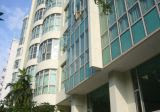Managing Director, Khazanah Nasional Bhd
This was a delicate budget to craft given the trilemma of the fragility of the global economic recovery, the need to address the fiscal deficit and the urgent drive for structural transformation towards a more innovative and competitive economy.
Against this difficult backdrop, it was a balanced yet bold budget. The evidence of taking the bull by its horns is most apparent in the significant cut in government expenditure, the first in 23 years, and especially in operating expenditure.
While the market and the public will await the crucial implementation details, the boldness of the budget is also evident in addressing difficult but pivotal issues such as the focus to reduce fuel subsidies, some early moves towards a more open and progressive automotive policy, preparing the ground for a broader tax base and tackling bureaucracy in critical areas such as education and human capital policies.
The ongoing work and the repeated focus on NKRAs will certainly help support the need to get greater bang for the limited buck that a fiscal consolidation year will demand.
There is much for Khazanah and our Government-Linked Companies (GLCs) to continue doing and supporting in this budget; from driving and aggregating private investments, implementing investments in niche growth sectors and continuing with our transformation programme.
Datuk Seri Abdul Wahid Omar
President & CEO of Maybank and Chairman of the Association of Banks in Malaysia
I must say that I am pleasantly surprised by the Government's commitment to reduce Budget deficit from 7.4% in 2009 to 5.6% in 2010. This is more aggressive than the level forecast by most analysts at around 7 to 8%.
This should instill greater confidence in the Government's prudent financial management, promotion of 'value for money' concept in spending, targetted fuel subsidy management and even instilling the entrepreneurial spirit among civil servants.
I am referring to the proposal to encourage Government agencies to rent out their premises & equipment to third parties where they get to keep 50% of the revenues!
For the financial services industry, we welcome the extension of tax incentives for the promotion of Islamic financial services and further liberalisation of the capital markets.
The flexible brokerage sharing between stockbrokers and remisiers will allow greater flexibility for brokers to reward good performing remisiers which is currently capped at 40% of brokerage fee. We also welcome the mandating of electronic payment of dividends for listed companies which will further promote e-payments and reduce administrative burden of listed companies and shareholders alike.
The Budget 2010, however, contained two aspects which will affect the financial services industry. Firstly on the introduction of RM50 per annum service tax for credit and charge cards. Secondly on the reintroduction of RPGT, albeit at a much lower rate of 5%.
Whilst this may reduce some speculative elements in the property market, it will also result in lower growth in housing/property loans for the banks.
For the individual taxpayers, there is plenty to cheer in the form of higher tax reliefs totaling RM2,500 (inclusive of broadband subscription) and lowering of top personal income tax rate from 27% to 26%. Thank you YAB Prime Minister.
Datuk Seri Nazir Razak
Group Chief Executive, CIMB Group
It's a well crafted, action oriented budget. It is refreshing to see initiatives that are so consistent with the announced thrusts and policy direction of the administration.
The budget will stimulate the private sector, enable us to reduce dependency on the government and set the stage for the new economic model, while the forecasts made will alleviate concerns about the fiscal deficit.
We also welcome the liberalisation of remisier commission sharing as this is well overdue and will enhance competitiveness of the stockbroking industry.
Datuk Yusli Mohamed Yusoff
Chief Executive Officer, BURSA MALAYSIA BHD []
The 2010 Budget announcement made by the Prime Minister today certainly reinforced the Government's commitment towards ensuring steady and sustainable long-term economic growth. We are pleased with some of the measures announced in stimulating the capital market.
The liberalisation of the commission sharing arrangement between stockbrokers and remisiers will balance the risk-return ratio for the remisiers. This market based commission incentive model will motivate the remisiers towards galvanising more interest by investors in the stock market as an investment option. We also hope that this market based incentive model will see more new blood entering the industry.
In moving towards a more internationalised investment platform, we are pleased to note the allowance of 100% foreign equity participation in corporate finance and corporate financial planning companies. We hope this will see more international names capitalising on this opportunity, and diversify the level of offerings and talents to benefit the Malaysian market. We also see this spurring more corporate actions in the market.
Bursa Malaysia has always worked towards increasing business and operational efficiency and we believe that TECHNOLOGY has served us well in giving greater efficiency, access and convenience, as is evident in our implementation of services such as Direct Market Access (DMA).
We are also seeing electronic trading gain greater traffic as time goes by and this certainly complements the announcement that all listed companies are required to offer e-Dividends to their shareholders. This will reduce time and provide convenience to the shareholders. As a listed company, Bursa Malaysia already offers its shareholders e-Dividend payment mode as an option for the benefit of its shareholders. Issuers too, will benefit from the ease of implementation.
The Government's objective to reduce financial dependence via privatisation of some of its companies and agencies will hopefully see these government assets coming to the capital market to raise funds via listing.
Bursa Malaysia is committed to efforts to position the country as an Islamic investment hub, and we are pleased with the announcements made in today's Budget that further cement this intent. We look at the announcements collectively as an incentive to further facilitate the internationalisation of our Islamic finance capabilities and attract foreign issuers and non-Ringgit issuers to Malaysia.
The stamp duty exemption of 20% on Islamic financing instruments will encourage further issuance of sukuk and Islamic finance notes. In giving tax exemption on banking profits derived from overseas operations, it will encourage the internationalisation of banks and we see a spillover effect to complement capital market activities. We see these announcements facilitative of our efforts in making Malaysia the preferred destination for Islamic finance investment and fundraising.
I am pleased to note that amidst the incentives to enhance the competitiveness of the capital market, protecting the integrity of the market and country has not been compromised. We are encouraged by the Government's stance on the formulation of a Whistle Blower Act. This will greatly complement our corporate governance framework that will ensure that we maintain a market of integrity.
Jeffrey Chew
Director & CEO, OCBC Bank (Malaysia) Bhd
In the 2010 National Budget, the Prime Minister has hit the right notes to reshape the economy by focusing on education, ICT and green technology to propel the nation into a high income economy. At the rakyat level, consumers would now enjoy a greater level of disposable income via the various tax deductions and other personal tax relief.
The budget deficit for 2010 is estimated at 5.6% of GDP, which we believe is achievable. The lower deficit position is mainly due to the government's proposed total allocations of RM191.5b, down 11.2% from the previous 2009 allocations of RM215.7b. The move toward improving fiscal discipline is laudable especially since the Malaysian economy is expected to see a less severe contraction of 3% this year and should recover to grow by 2-3% in 2010. Generally, we view the Government's intention to reduce its deficit position will be positive to the debt capital market as the supply of Government securities are no longer expected to blow out of proportion.
The budget's focus on private investment, especially in attracting FDIs and privatising companies under MOF, is a good economic initiative to strengthen the growth drivers.
Retail banking
While we understand the Government's effort to encourage prudent spending, we are concerned over the imposition of the service tax of RM50 for principal credit cards and RM25 for supplementary cards respectively. This may only increase the burden of both the industry and the consumer. The credit card is a product of payment convenience and facilitates cash substitution. Therefore, the imposition of this tax would not curb its usage or necessarily encourage prudent spending.
The imposition of the 5% real capital gains tax on PROPERTIES is a counter-productive move in encouraging property investments among local and foreign investors, particularly in attracting REITs investors. Furthermore, this would make Malaysia's property market less attractive as compared to our neighbouring countries in Southeast Asia despite our property prices being among the lowest in the region.
Capital markets
The tax neutrality between conventional and Islamic financing has been further fine-tuned to ensure that the non-RM sukuk market is given further prominence with various tax incentives. These include tax exemptions on profits derived and expenses incurred from the issuance of sukuk and special purpose vehicles (SPV) established under the Offshore Companies Act for the purposes of issuance of Islamic securities, amongst others.
Whilst these measures will indeed drive the supply of non-RM sukuk and thus position the country as a strong regional Islamic sukuk hub, critical measures are still required to be undertaken to develop a regional-level sukuk market. These entail, amongst others, developing a regional clearing & settlement system, a vibrant secondary market by virtue of price transparency, promoting regional credit rating agencies and harmonising Shariah standards.
Islamic banking
We are encouraged by the Government's continued commitment to Islamic banking with the various tax incentives that continue to be granted. This augurs well for our efforts to make Malaysia a vibrant Islamic finance hub.
Najib Abdullah
Group Managing Director, MIDF
Malaysian Industrial Development Finance Berhad (MIDF) said it is confident Budget 2010 will provide the necessary momentum to the economy amid signs that a revival is under way. It is also a precursor to the new economic model that the government is formulating.
The stimulus programme has been an effective response to the global financial crisis and the government appears to be building an orderly exit framework. It is important to ensure that such a programme does not become a permanently entrenched feature of the public sector as it is definitely not sustainable over the long term.
Although total government spending in 2010 is budgeted to be 11.3% lower than that this year, most of the cutback will come from operating expenditure and not development expenditure.
This is a clear indication that the government is focused on enhancing the management of public services, rooting out operational inefficiencies. It is about increasing productivity and channelling precious resources towards capability building and more strategic purposes.
An indictment of this is the fact that total government's subsidies budgeted next year is only RM20.9 billion, down from the RM24.5 billion spent in 2009 and RM35.2 billion in 2008.
The message is clear - moving forward, subsidies will be more discriminating and targeted, rather than inefficiently spread across the board.
Through its Development Finance Division, MIDF was allocated RM50 million and RM125 million under the First and Second Stimulus Package respectively to be extended to SMEs and non-SMEs in the form of soft loans.
Soft Loan Scheme for Services Capacity Development (SLSCD), provided in the first stimulus package was aimed at improving the productivity of the services sector while the Soft Loan Scheme for Automotive Development (SLSAD) is to assist the automotive parts and components manufacturers to rationalise their operations.
To date, the allocations under the SLSCD has been fully committed. As for SLSAD, RM86.2 million has been approved. MIDF has sufficient applications in the pipeline to take-up the balance of SLSAD and we foresee the funds will be exhausted by the end of the year.
From MIDF's standpoint, the Budget is conducive for the business community given the focus on the services sector as the GDP growth driver in 2010. The 20101 budget has laid the foundation for a new and holistic economic model.
As a strategic business enabler to the 548,267 Small and Medium Enterprises (SME) companies in Malaysia, which make up 99.2% of all established businesses in the country and contribute 32% of the national Gross Domestic Product (GDP), MIDF is pleased to note that the interests of the SMEs are addressed in the Budget.
This is in consonant with the overall objective to raise the contribution of SMEs to GDP to 37% by 2010, from the 32% estimated in 2005. The move to rationalise the number of funds and grants, as well as enforcing the deadlines for micro financing approvals and disbursements are positive for the growth and development of the SMEs in Malaysia.
The 2010 Budget announcement is timely since the previous SME funds allocated to MIDF through SME Corp. had all been fully committed. MIDF lauds the announcement on the additional RM350 million SME funds, of which RM200 million will be made available in the form of soft loans. These soft loans will give access for SMEs to tap for funding at concessionary interest rates.
MIDF's role is to facilitate the accessibility of these funds to SMEs and provide continuous effort aimed at building their capabilities and capacities to stay resilient and competitive, thus contribute to the country's drive towards high income economy.
The Malaysian capital market is experiencing a recovery currently with the FBM KLCI index closing the week at 1,267 points, its best performance this year. The move to liberalise the commission structure with effect from 2011 in the equity market will carry positive long-term benefits, as it will create more robust competition.
This also applies to the move to allow full foreign ownership in corporate finance and financial planning firms. MIDF welcomes further moves to liberalise the financial services sector as it believes that competition and market forces are necessary ingredients for a robust capital market and more importantly the rakyat.
In the final analysis, the Budget has painted a generally cautious optimistic macro scenario next year, with GDP growth projected to be at only 2.5%, a pace which is slower than the world's output growth as projected by the IMF. It reflects conservative baseline expectation with regard to the economic performance in the U.S. and major Europe. Should there be a meaningful turnaround in those economies, MIDF expects Malaysia to stand ready to reap the benefits and growth could be more robust than anticipated.



No comments:
Post a Comment